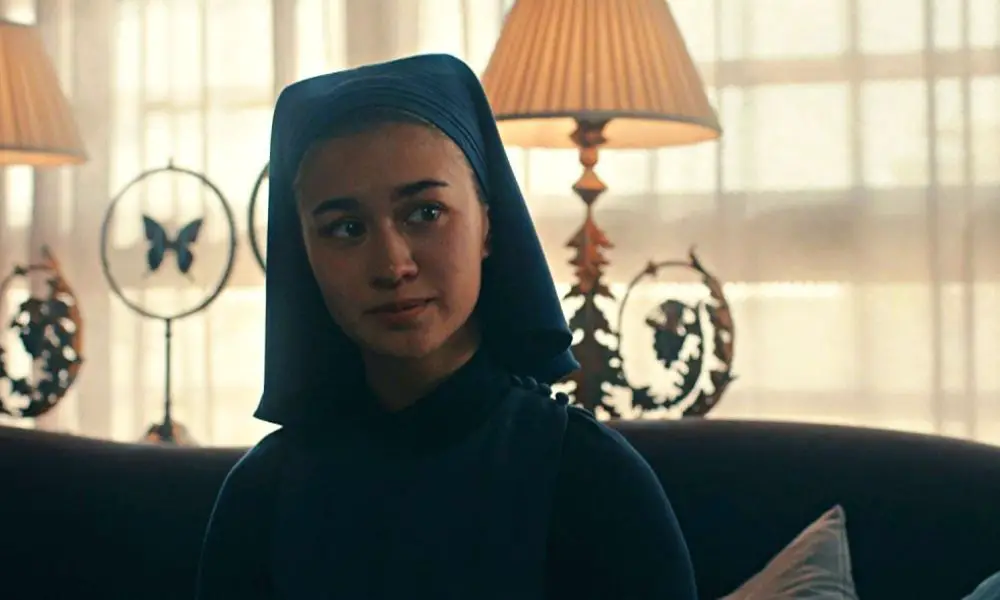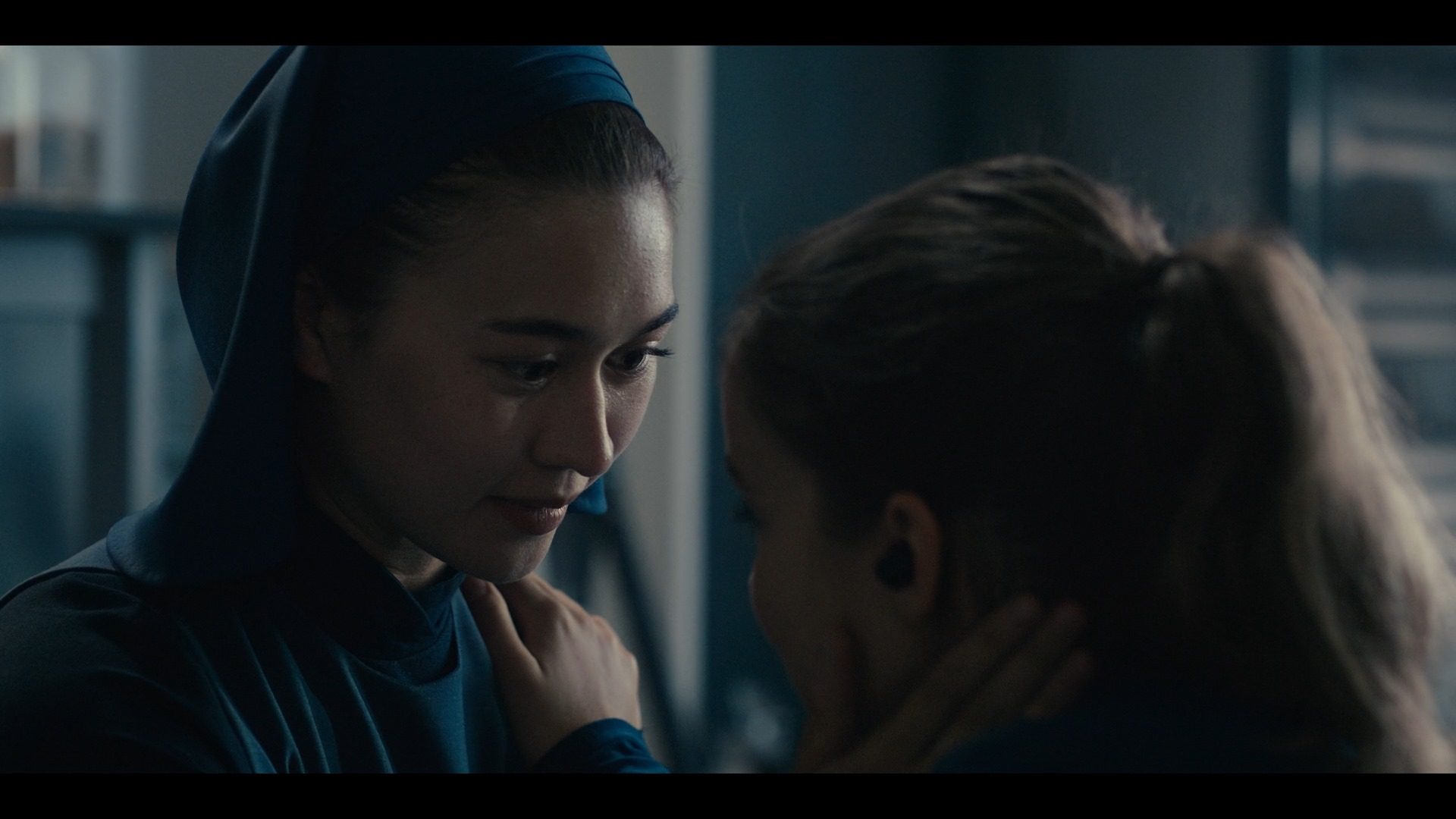- Sister Beatrice and the Church (Part 1)
- Sister Beatrice and the Church (Part 2)
- Sister Beatrice And The Church (Part 3)
Content Warning: Homophobia
Spoilers for all of Warrior Nun season 1.
That’s it! We’ve gone too long without talking about Warrior Nun here at The Fandomentals. In the effort to rectify the situation at once, I’m here to talk about something I’ve been pondering since first watching the show last year: Sister Beatrice’s relationship with the Church.
As a quick refresher, Warrior Nun centers on the work of the Order of the Cruciform Sword (OCS), a fictional sect of the Catholic Church dedicated to fighting demons on earth. This organization is populated by Sister Warriors led by the Warrior Nun, who bears the halo of an angel (maybe?) on her back. Sister Beatrice is one of the aforementioned Sister Warriors.
It’s no secret that Beatrice is a character who spoke to me meaningfully since my first watch, not least because she’s the prime example of a Dutiful Princess, a character type I gravitate towards. Her relationship to the Church as a queer woman is another point of interest, and you can hear me waffling slightly about this in the Ladies First episode, before I had pinned down why I found it so fascinating.
There is no shortage of stories about queer identities and religion in fiction (especially to do with Christianity). In fact, one of my 2020 obsessions, The Wilds has a very well done example of a young girl coming to terms with her sexuality away from her Evangelical upbringing.
Beatrice’s story is unique however, for a lot of reasons. Not only is she not in denial but she is acutely self-aware. She has joined the Church “to save her immortal soul,” as she herself puts it. It would be easy to assume then that if she trust the Church to help her on her way to salvation, that she follows and believes the institution blindly, but again, that is not the case. Beatrice is aware of the cracks in the foundation of the institution, and expresses her belief that being loyal to God does not necessarily equal loyalty to the Church and its authority figures. Why, then, continue to be obedient? Why remain?
Beatrice presents as no-nonsense, goal-oriented, bordering on cold at certain times. She is duty bound, putting the interests of the institution above that of her own. But as soon as you manage to scratch the surface, it’s easy to find a guilt and pain hidden behind the walls she puts up.
My theory is that Beatrice’s relationship with the Church is not only a form of deliberate self-repression, it’s also a form of penance. Penance for the perceived sin of who she is. This reading in mind, and after the events of season one, I see only one path forward for Beatrice: to leave the Church.
Now that is not to say that Beatrice has to renounce her faith, no. Catholicism and queerness is certainly hard to reconcile, but not impossible. My interpretation is rather that she joined the institution of the Church for the wrong reasons, and that with the pieces laid out in front of her in season 1 (the foundational lie of the OCS, Adriel, Vincent’s betrayal, Ava…), I can’t see a future for Beatrice where she’s able to go back to where she was at the beginning regarding her relationship with the Church and her vows.
In the fist part of this series I will be analyzing Beatrice’s character through the lens of certain aspects of Catholic dogma, to try to understand the logic behind her joining and then remaining in the Church.
So, come with me on this over-analyzing journey. I must warn you, this might get a little unhinged; remember I’ve thought about this semi-consistently for over a year.

Beatrice’s Penance
According to Oxford Languages, penance is “voluntary self-punishment inflicted as an outward expression of repentance for having done wrong.” In the Catholic religion, penance is a sacrament; part of the foundational rites.
When a Catholic has sinned, they must go to confession, where the priest will prescribe a penance. Oftentimes it’s prayer, but penance can take many forms. One might also do penance voluntarily without an official prescription, though it is notable that in the dogma of the Church, only an ordained priest may grant absolution for the sin.
There are several aspects of Beatrice’s characterization and story that to me indicate that she’s taken the religious life as a form of penance, even if indirectly.
What little we know of her upbringing seems to suggest she was raised in a conservative and religious home. Beatrice says to Ava in episode 1×03 that she wasn’t “falling into line” with her conservative parents. Their response was to send her to Catholic boarding school.
“[…] I guess it kind of stuck.”
-Beatrice re: her Catholic education
There are a lot of implications there, and Ava can immediately see that “there is more to it that [Beatrice is] telling.”
Later, in 1×08, Beatrice comes out to Ava as queer in a very emotional scene. We continue to fill out the initial picture Beatrice was painting in 1×03. Beatrice is queer—plus a little bit of a cheeky rebel, judging by her starting the nickname “Cruella de Jesus” after taking vows—, her parents didn’t like this, so they sent her to be put back in line through a strict religious education.
Perhaps it’s reading way too much into things, but it strikes me that Beatrice learned more than discipline and respect at her boarding school. The Catholic Church has historically negative views on homosexuality, so some of Beatrice’s formative years were spent surrounded by the message that who she is, is wrong. It might be that she also enjoyed the discipline and studiousness a religious life implies. Or both things can be true at the same time.
The argument that what “stuck” were the Church’s views on homosexuality is supported when connected to her confession to Ava in 1×08:
“I became skilled at so many things just so I would still have value, despite my flaws… or what I’d been taught was a flaw. Of course, I tried to fit in, but when you’re punished just for being different, you begin to hate what you are.”
It’s clear Beatrice has absorbed these teachings. When someone is told over and over that what they are is inherently wrong, coupled with the Church’s teachings on sin and penance, then it stands to reason that a person would seek self-punishment.
In 1×05, Cardinal Duretti praises Beatrice’s skill, commending that she’d spent her free time learning many skills, and comments that she’s had more time to prepare for what life throws her way. To this Beatrice responds that she’s also had “less time to actually a enjoy it.” This to me implies a certain resentment, which lines up with her words to Ava in 1×08.
She sought so many skills to make up for her flaw (to repent for this sin), and the free time she’s spent on it was to her a sacrifice (penance).
Beatrice and Guilt
There is implicit culpability in seeking penance; one is admitting guilt. Beatrice falls so neatly into the Dutiful Princess trope in part because her narrative is colored with guilt. You don’t have to stretch the imagination much to gather where it might have come from. There is an intimate relationship between the Catholic religion and guilt.
The Confiteor is a prayer said at the beginning of every mass where a person confesses to sinning constantly.
“[…]in what I have done and in what I have failed to do, by my fault, by my fault, by my most grievous fault.”
Confiteor prayer
Guilt is built into the Roman Catholic faith. Humans are sinners and can never stop sinning. And when one sins one must repent. Thus, you are caught in an endless cycle of sinning and repenting. Now, if your sin is not only what you do, but who you are, it’s a double bind. Nay, a triple bind.

Beatrice was already doing acts of penance by renouncing all of her free time to seek an absolution. It follows then that she stuck with the Church for the same reason.
Of course the teachings absorbed in Church weren’t her only motivation. There is the parental element in Beatrice’s story, and her possibly either seeking her parents’ approval or trying to piss them off. For now, it’s unclear which it is. Though the detail about them being politicians speaks volumes, but more on that later.
Beatrice’s Vows
Religious sisters take public vows of poverty, chastity and obedience, and dedicate their lives to the needs of society, as ordered by the Church. To take such vow is to answer a calling from God to serve.
Of course there is an element of fantasy in Warrior Nun, as she is a Sister Warrior, skilled in combat and trained to fight wraith demons. Personally, I’ve never heard of such a sect, but who knows, right? The demon-fighting would fulfill the service to society, so I’m assuming here that Beatrice did take the basic vows of poverty, chastity and obedience, as did all the Sister Warriors in the OCS.
In addition to public vows, it’s quite common for Catholics to make private vows. In very basic terms, it’s a promise made to God or a Saint in exchange for something – an answer to a prayer or a miracle. Many people promise to make pilgrimages to holy places for example. Others might vow to stop eating gluten, or promise not to cut their hair in 10 years, or vows of silence. Vows can get weird and intense, depending on what one is asking for.
It is not illogical, then, to imagine someone vowing to take public vows and give themselves to the religious life in exchange, for, say, saving their immortal soul.
Bear with me: Beatrice is not falling into line, so her parents send her to Catholic school, where she learns to absorb the lesson that who she is a sin. She then seeks to give herself value by becoming skilled at many things to make up for that, but that perhaps doesn’t bring her the feeling of certainty that she has made up for her “flaws”. Living a religious life could perhaps guarantee salvation. So Beatrice decides to join the Church. By joining in, Beatrice is guaranteeing that she’ll self-repress forever. She has, after all, taken a vow of chastity.
Dutiful Beatrice
Beatrice takes her vows very seriously. We see her obey even while having doubts about the righteousness of her actions on at least one occasion. After she joins, and because of her many skills, she’s referred to the OCS, perhaps the most unorthodox sect (although who knows, in the Warrior Nun universe).
There she finds something unexpected: a priest that is more flexible than could reasonably be expected, a mission she believes in, and friends. Sisters in more than one sense of the word, who will fight for and protect each other. We know she didn’t have any friends before, as her official dossier classifies her as a loner (1×05). These sisters will become a major complication in keeping her vow of obedience, challenging her Dutiful nature.
After perhaps expecting to self-punish forever, Beatrice finds herself fighting for a cause she believes in, alongside people she loves. Within the OCS it is also implied that, so far, she has believed and trusted in her immediate authority. There is even an implication that the OCS sometimes has an us versus them attitude when it comes to the Church at large.
Beatrice has ostensibly always known there are foundational cracks in the institution. As Taylor mentioned in her phenomenal series on Warrior Nun as a trauma narrative, “Because she grew up embedded in politics, her parents must have raised her to accept complexities in organizations and in people, and taught her, conversely, that acceptance comes at the expense of her authentic self.” So far, being in the OCS, the cracks have perhaps become increasingly easy to ignore.

The Bleeding Cracks
If you follow her story closely, you can spot the many times Beatrice subtly questions the orders and duties she follows. And it starts with Ava.
The night of Shannon’s death, after Ava is accidentally resurrected and her and the halo goes missing, she inquiries about what’s to happen at least three times. She keeps prodding Vincent for answers as to what’s to come of Ava, how they’ll handle her, and whether they’re meant to potentially kill her. It almost seems like she has an opinion, but withholds it at this point.
Later, when the Cardinal orders them to go after ARQ-Tech, Camila displays anxiety about what they’re doing there. Beatrice indicates she knows Duretti is changing the agenda of the OCS. There’s a skepticism there, but still, she follows her orders.
She puts that skepticism on display in her conversation with Duretti in 1×05. After she’s carried out his orders (and blatantly broken the law), he congratulates her and confirms her suspicion that Duretti is changing their agenda, possibly for personal gain.
Cardinal Duretti: “I would like to know that I can count on you to remain faithful to the will of the Church.”
Beatrice: “You may always count on me to remain faithful. To God.”
It’s relevant to mention that a Cardinal is only one step below the Pope in the hierarchy of the Roman Catholic Church. Beatrice recognizes his authority by following his orders, then directly questions it while looking him in the eye. It’s an interesting juxtaposition. At this point it’s fairly clear she’s not personally happy with the direction the OCS is taking, but she remains steadfast in her compliance up to this point.
The first time she goes against orders is actually 1×06, when she picks up Mary from the village where she and Ava have bonded and Mary’s introduced Ava to the mission of the OCS. Beatrice and the entire OCS has orders to retrieve Ava (or really the halo) and bring her back. She can see Ava in the rear view mirror, but she does nothing.
After her and Father Vincent receive their dismissals (which she does protest openly), Mary calls upon them to hatch up a plan to go rogue and keep investigating Shannon’s death.
Mary: “We’ve lost everything we’ve fought for. There’s nothing more to lose.”
Beatrice: “Maybe not for you. But I joined the Church to save my eternal soul.”
This is strange, right? Because at this point we know Beatrice is aware that Church does not equal God, and in that sense, it does not have the ultimate authority over what is wrong and right. Who gets salvation, who doesn’t. Yet she’s still stating her belief that it’s staying in the Church and doing its bidding is what’s going to save her immortal soul.
Of course at this point that is wavering, but it is notable that even when she’s been removed so very clearly for a suspect agenda, when the evidence seems points to is responsible for her dear friend and mentor’s death, she’s still willing to entertain the idea that it’s the Church that can absolve her.
This is because leaving an authoritarian religious institution to which you have been indoctrinated is very complicated. Leaving the Church challenges everything Beatrice has made herself to be.
Beatrice’s Religious Trauma
In her series (which you should go read if you haven’t), Taylor mentioned Religious Trauma Syndrome (RTS), a specific condition that people who struggle to leave an authoritarian, dogmatic religion experience.
In her article on it, Marlene Winell describes part of the cycle of abuse:
“You must conform to a mental test of ‘believing’ in an external, unseen source for salvation, and maintain this state of belief until death. You cannot ever stop sinning altogether, so you must continue to confess and be forgiven, hoping that you have met the criteria despite complete lack of feedback about whether you will actually make it to heaven.”
-Marlene Winell (2011)
Just like Taylor wasn’t diagnosing Ava, I’m not seeking to diagnose Beatrice, rather to use this as a lens of analysis. The promise of salvation vs the threat of eternal damnation becomes stressful without guidance, and what the Church offers is a modicum of certainty that you’re on the right path (according to them, of course). Beatrice clings to the Church because without it, her future and her fate become hazy.
If you accept the reading I’m proposing, then the decision she makes soon after that conversation to disobey and outright challenge the OCS and the Church becomes even more momentous. It is the victory of faith in herself, her instincts and in the calling she’s found. I also think that in this instance, the certainty of her sisters’ love wins over the uncertainty of salvation in exchange for obedience. That she is later willing to break into the Vatican and blow it up is a huge step up from that. And that is where The Ava Factor comes in (wink, wink).
In the next piece, I will discuss how Ava crash landing into her life forces Beatrice to take the veil from her eyes. I’ll also discuss Beatrice’s treatment of Ava, and what the Avatrice foreshadowing means for Bea’s future.
So, if you enjoyed this level of reading too much into everything, stay tuned for Part 2!

Images courtesy of Netflix and FX/FXX
Have strong thoughts about this piece you need to share? Or maybe there’s something else on your mind you’re wanting to talk about with fellow Fandomentals? Head on over to our Community server to join in the conversation!

